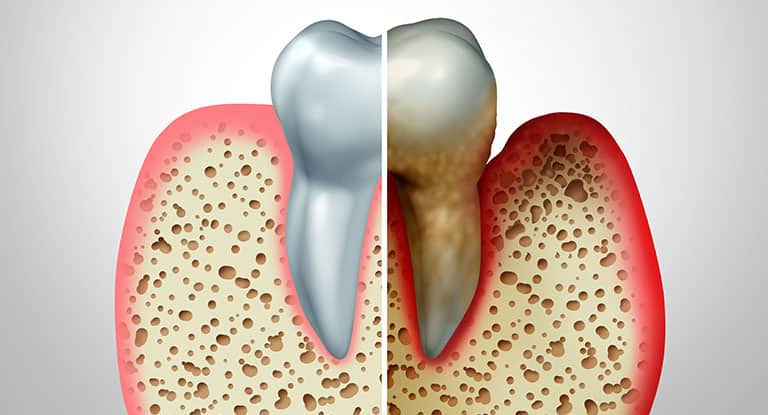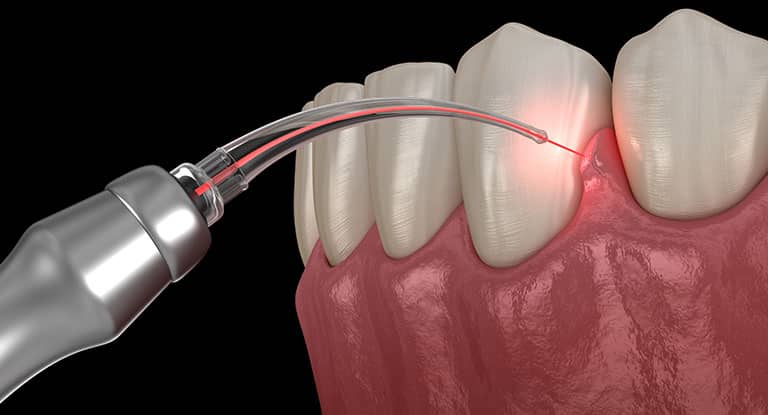

Gum diseases are a common dental issue affecting millions of people worldwide, and it is one of the risk factors for heart disease.
What is gum disease?
The gums are the tissues supporting the teeth and gum disease is characterised by the swelling, infection, or soreness of the gums. Two forms of gum disease exist, and they are periodontal disease and gingivitis.
What is gingivitis?
Gingivitis simply means inflammation of the gums; it occurs when the gums around your teeth become swollen and red. The swollen gums might bleed when you brush or clean your teeth.

What is a periodontal disease?
Periodontal disease occurs as a result of leaving gingivitis untreated for a long time. There are different types of periodontal disease, and they all affect your gums. When periodontal disease is left untreated, it progresses and damages the bones supporting the teeth and jaw; some times, this bone is lost, and the teeth become loose.
Your teeth can eventually fall out if this is not treated.
Am I likely to suffer from gum disease?
Most people suffer from different forms of gum diseases. It is the leading cause of tooth loss in adults. This disease develops very slowly in most people, and it can be slowed down by prompt treatment so that it won’t cause severe damage and make you lose most of your teeth.
What is the cause of gum disease?
Plaque is responsible for gum disease, and it covers the surface of your teeth. Most bacteria in plaque are harmless while some cause severe problems like gum disease. Make sure you remove plaque from your teeth every day — you can do this by brushing your teeth daily and cleaning in between your teeth using interdental brushes or floss.
How will smoking affect my gum and teeth?
Smoking aggravates gum diseases. People who smoke produce more bacterial plaque than non-smokers. Smoking reduces the oxygen level in the bloodstream, and this affects the healing process of the gum.
Gum disease gets worse in smokers than in non-smokers, and it also increases plaque in the mouth.
What happens if your gum disease is not treated?
Gum disease does not cause pain, so it can get worse and cause a lot of damages without you knowing. However, when the bacteria are more active, it can make your gum sore.
This may lead to gum abscess and lead to the oozing of pus around the teeth. Over the years, you can lose the bone supporting your teeth, and if it is not treated for a long time, treatment will be more complex. You can visit our dentist today before that gum disease worsens.

What do I do if I think I have gum disease?
The first step to take is to visit a dentist — a thorough check-up of your teeth and gums will be done, and the cuff of gum around each tooth will be measured to see if there are signs of periodontal disease.
X-rays might also be carried out to see the number of bones that have been lost. These tests are essential as it helps your dentist to give you the right treatment.
What treatments are needed?
In treating gum disease, all the plaques and tartar from your teeth will be removed, and you will be taught on how to do this all by yourself. You will be able to clean all the surfaces of your teeth effectively and thoroughly.
This will require several sessions with your dentist. One very important thing you can do to prevent gum disease from progressing is to have a good oral care routine at home. This goes along with regular brushing and interdental cleaning.
What else may be needed?
When your teeth are clean again, the dentist will treat the root of the teeth to remove the last pockets of bacteria. This treatment is called root planing, and the treatment area is numbed before doing anything.
However, you might feel some discomfort for up to 2 days.
How can an individual know if they have gum disease?
The first sign of gum disease is the appearance of blood on your toothbrush. It can also appear in the toothpaste when you spit it out after cleaning your teeth.
Another sign of gum disease is when your gum bleeds when you are eating, this will leave an unpleasant taste in your mouth, and your breath can be awful.

Can I have periodontal disease again after treatment?
Periodontal disease has no known cure, but it can be kept under control. You do this by continuing the home care routine you have been taught.
Further bone loss will be slow, and it may stop. An effective way to prevent this from occurring is to remove plaque every day from your teeth and go for regular dental check-up.
Are there health conditions linked with gum disease?
Recent studies have shown the links between gum disease and health conditions such as heart disease, cardiovascular disease, stroke, diabetes, dementia, and poor outcomes in pregnancy.
Further research is still needed to explain how these works, but there is more evidence that healthy gums promote good health. It reduces the costs of medical treatment and improves your overall health.
If you are suffering from gum disease, you can contact the dentist in Harley Street London. We can help you put it under control through our professional help and give expert advice.